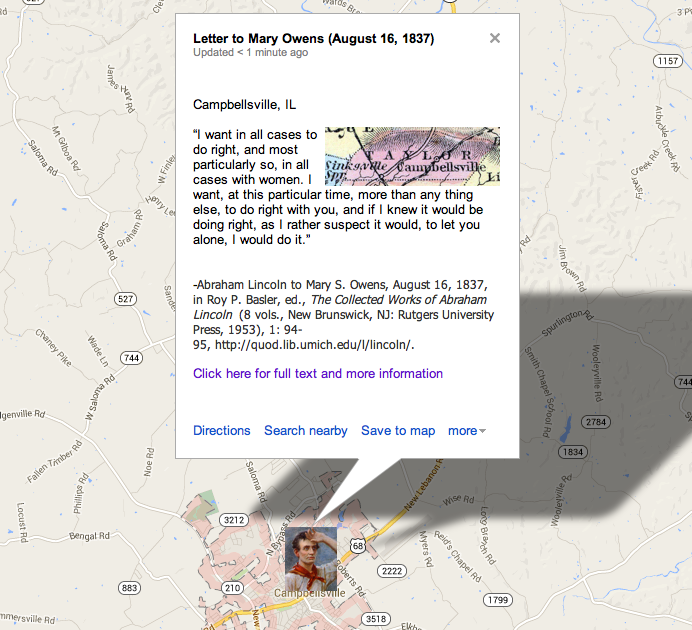Ranking
#91 on the list of 150 Most Teachable Lincoln Documents
Annotated Transcript
“I want in all cases to do right, and most particularly so, in all cases with women. I want, at this particular time, more than any thing else, to do right with you, and if I knew it would be doing right, as I rather suspect it would, to let you alone, I would do it.”
On This Date
HD Daily Report, August 16, 1837
The Lincoln Log, August 16, 1837
Custom Map

View in Larger Map
How Historians Interpret
“Not surprisingly, Mary Owens rejected this diffident proposal. As she later explained, “Mr. Lincoln was deficient in those little links which make up the chain of woman’s happiness…Not that I believed it proceeded from a lack of goodness of heart; but his training had been different from mine; hence there was not that congeniality which would otherwise have existed.” Lincoln had behaved in ways that she understandably considered thoughtless and insensitive to her feelings. One day, for example, while riding with other New Salem young women and their swains, they have to a creek. All the men save Lincoln gallantly helped their companions cross. Owens chided her escort, You are a nice fellow! I suppose you did not care whether my neck was broken or not.” Lincoln replied laughingly that he reckoned she was plenty smart enough to care for herself.”
—Michael Burlingame, The Inner World of Abraham Lincoln (University of Illinois Press, 1997), 134.
“Evidently Lincoln wished to escape gracefully from a romance now gone stale. If so, the lady obliged him. She ignored his letter, and they never met again.”
—Benjamin P. Thomas, Abraham Lincoln: A Biography (SIU Press, 2008), 70.
NOTE TO READERS
This page is under construction and will be developed further by students in the new “Understanding Lincoln” online course sponsored by the House Divided Project at Dickinson College and the Gilder Lehrman Institute of American History. To find out more about the course and to see some of our videotaped class sessions, including virtual field trips to Ford’s Theatre and Gettysburg, please visit our Livestream page at http://new.livestream.com/gilderlehrman/lincoln
Searchable Text
Springfield
Aug. 16th 1837
Friend Mary.
You will, no doubt, think it rather strange, that I should write you a letter on the same day on which we parted; and I can only account for it by supposing, that seeing you lately makes me think of you more than usual, while at our late meeting we had but few expressions of thoughts. You must know that I can not see you, or think of you, with entire indifference; and yet it may be, that you, are mistaken in regard to what my real feelings towards you are. If I knew you were not, I should not trouble you with this letter. Perhaps any other man would know enough without further information; but I consider it my peculiar right to plead ignorance, and your bounden duty to allow the plea. I want in all cases to do right, and most particularly so, in all cases with women. I want, at this particular time, more than any thing else, to do right with you, and if I knew it would be doing right, as I rather suspect it would, to let you alone, I would do it. And for the purpose of making the matter as plain as possible, I now say, that you can now drop the subject, dismiss your thoughts (if you ever had any) from me forever, and leave this letter unanswered, without calling forth one accusing murmer from me. And I will even go further, and say, that if it will add any thing to your comfort, or peace of mind, to do so, it is my sincere wish that you should. Do not understand by this, that I wish to cut your acquaintance. I mean no such thing. What I do wish is, that our further acquaintance shall depend upon yourself. If such further acquaintance would contribute nothing to your happiness, I am sure it would not to mine. If you feel yourself in any degree bound to me, I am now willing to release you, provided you wish it; while, on the other hand, I am willing, and even anxious to bind you faster, if I can be convinced that it will, in any considerable degree, add to your happiness. This, indeed, is the whole question with me. Nothing would make me more miserable than to believe you miserable—nothing more happy, than to know you were so.
In what I have now said, I think I can not be misunderstood; and to make myself understood, is the only object of this letter.
If it suits you best to not answer this—farewell—a long life and a merry one attend you. But if you conclude to write back, speak as plainly as I do. There can be neither harm nor danger, in saying, to me, any thing you think, just in the manner you think it.
My respects to your sister.
Your friend
LINCOLN.

